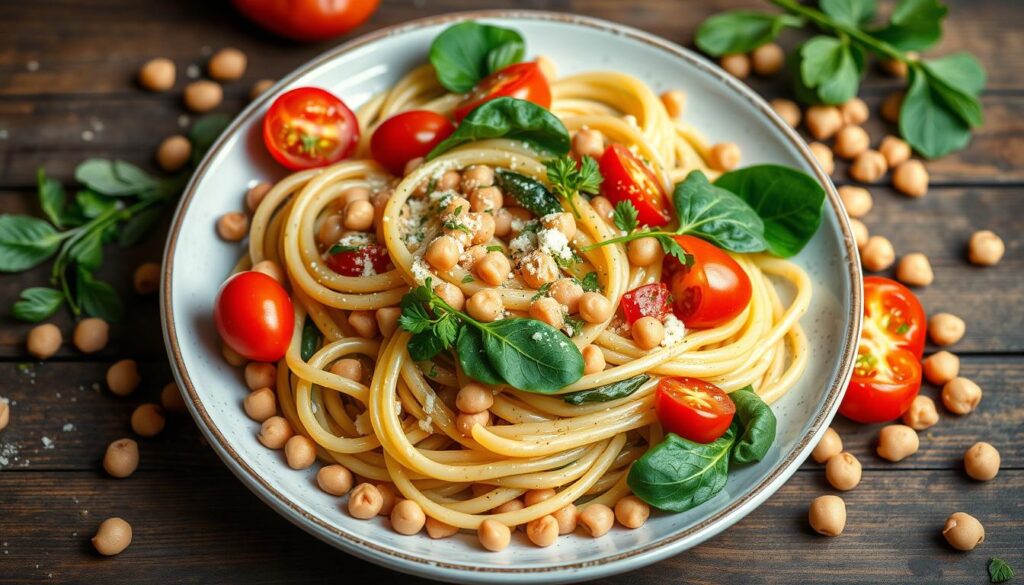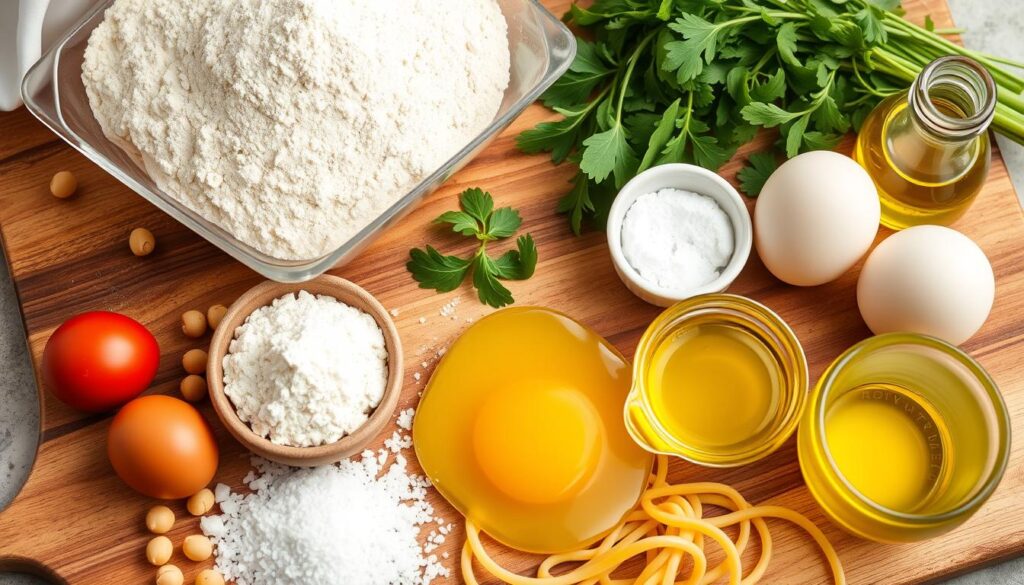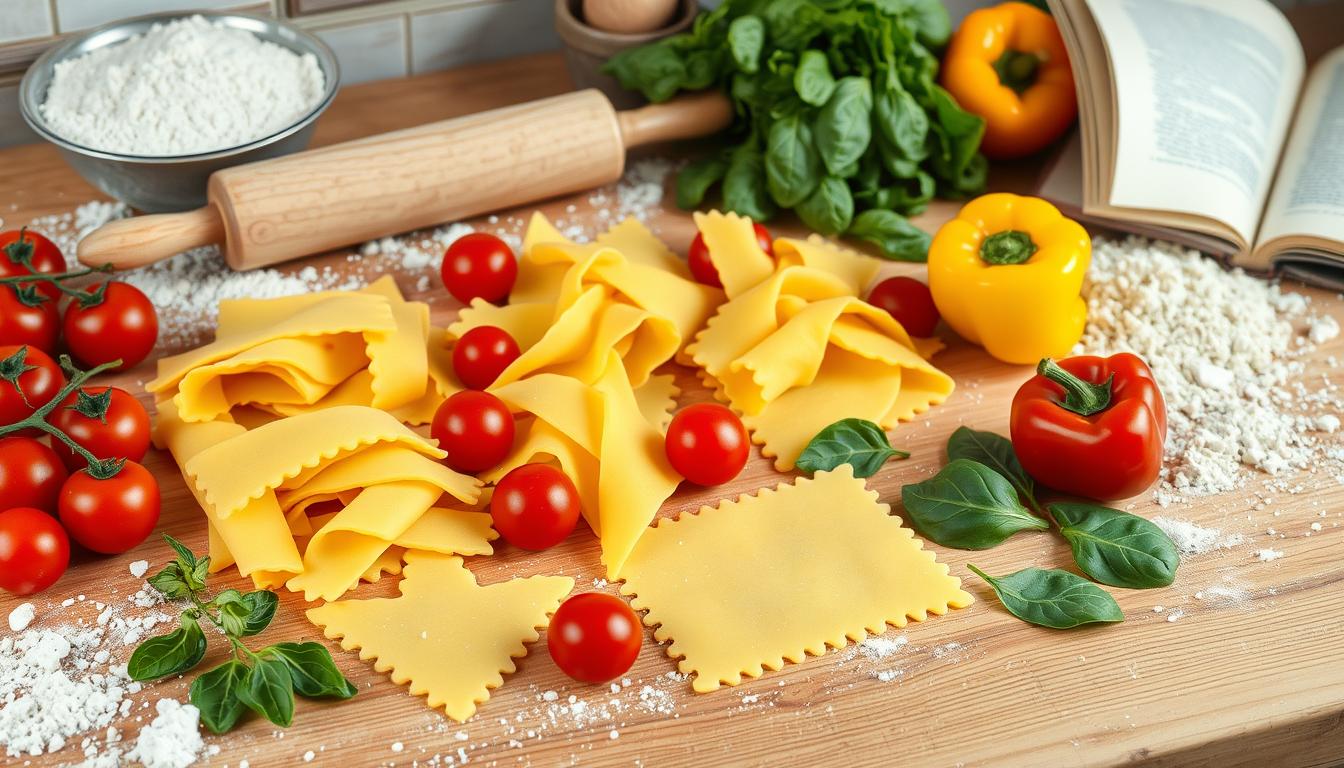I’m a busy mom who loves healthy food. I’m excited to share this easy chickpea pasta recipe with you. It’s gluten-free, packed with protein, and ready in 30 minutes. It’s perfect for a quick dinner.
This pasta is special because of its creamy sauce. It’s made with chickpeas and juicy tomatoes. Together, they make a dish that’s both comforting and full of flavor. Chickpeas are a great source of protein and nutrients, making this meal both nourishing and filling.
Table of Contents
Benefits of Making Homemade Chickpea Pasta
Chickpea pasta is a nutritious and versatile option. It’s a great choice for those who need a gluten-free pasta. Unlike regular pasta, chickpea pasta has more protein and fiber. This makes it more filling and satisfying.
Nutritional Advantages
Chickpea pasta is packed with nutrients. It has about 14 grams of protein per 2-ounce serving. This is key for muscle repair and growth. It also has 8 grams of fiber per serving, which is good for your digestive health and keeps you full longer.
Compared to white pasta, chickpea pasta is more nutritious. It has more protein and fiber. It also has a lower glycemic index. This means it won’t cause a sudden spike in blood sugar levels.
Cost-Effectiveness
Making chickpea pasta at home can save you money. The average American eats a lot of pasta each year. Homemade chickpea pasta recipe is a budget-friendly option compared to store-bought pasta.
Dietary Flexibility
Chickpea pasta is great for many diets, including gluten-free and vegan ones. It’s a nutritious base for many pasta dishes. This way, you can enjoy pasta while supporting your health and wellness goals.

By making chickpea pasta recipe at home, you control what goes into it. This helps you live a healthier lifestyle. With its great nutritional profile and many uses, chickpea pasta is a wonderful choice for a healthy pasta alternative.
Essential Ingredients and Kitchen Tools
Making tasty homemade chickpea pasta is easy with the right ingredients and tools. You’ll need chickpea flour, water, and salt. You might also add eggs or olive oil for extra flavor and texture.
To make the dough, use a food processor or blender. You’ll also need mixing bowls, a rolling pin, or a pasta machine. And, of course, a big pot to cook your pasta.
Adding fresh ingredients can make your pasta dish even better. Try using whole peeled tomatoes, rosemary, and Parmesan cheese. These can make your meal truly special.
| Chickpea Pasta Ingredients | Pasta-Making Tools | Kitchen Essentials |
|---|---|---|
|
|
|

With the right ingredients and tools, you can make a delicious and healthy chickpea pasta. Your whole family will love it.
Chickpea Pasta Recipe: Step-by-Step Guide
Try the tasty mix of protein-rich chickpeas and your favorite pasta. This recipe is great for those who follow a gluten-free, vegan, or health-conscious diet. It’s a delicious and healthy swap for regular pasta. Let’s get started on making your own chickpea pasta recipe.
Preparing the Chickpea Flour Mix
Begin by mixing 380 grams of cooked chickpeas with 225 grams of your favorite pasta shape. You can use spaghetti or fusilli. Add 2 tablespoons of olive oil, 20 grams of minced garlic (about 3 cloves), a pinch of chili flakes, and 1 teaspoon of salt. Mix everything well until it’s fully combined.
Kneading and Shaping Techniques
Now, knead the dough and shape your homemade pasta. On a clean, lightly floured surface, knead the chickpea mix until it’s smooth and pliable. Cover it with a damp cloth and rest for 30 minutes to let the gluten develop.
After resting, roll out the dough thinly with a rolling pin. Then, use a sharp knife or pasta cutter to cut it into your preferred pasta shapes. Or, use a pasta maker for even, thin sheets.
Cooking Instructions
Boil a large pot of salted water. Add the chickpea pasta recipe and cook for 3-5 minutes, stirring often, until it’s al dente. Drain the pasta, keeping a cup of the cooking liquid.
In another pan, sauté 225 grams of chopped tomatoes and 400 grams of tomato purée with the reserved liquid. Toss the cooked chickpea pasta with the tomato sauce. Add a tablespoon of plant-based parmesan and some parsley for garnish.
Enjoy your homemade chickpea pasta as a fulfilling and healthy meal. Feel free to try different sauces, veggies, and spices to make your own special flavors.
Tips for Perfect Texture and Consistency
To get the perfect chickpea pasta texture, you need to master cooking. Make sure not to overcook it to keep that al dente feel. Stir the chickpea pasta recipe constantly to stop it from sticking.
Slowly add water to keep the sauce right. For a creamier sauce, blend some chickpeas. Remember, the chickpea pasta will soak up liquid, so adjust the sauce as you serve.
| Cooking Tip | Benefit |
|---|---|
| Avoid overcooking | Maintains al dente texture |
| Stir continuously | Prevents sticking |
| Add water gradually | Controls sauce consistency |
| Blend some chickpeas | Creates a creamy texture |
| Adjust sauce thickness | Accounts for pasta absorption |
Follow these pasta cooking tips for perfect chickpea pasta every time.
“The key to perfect chickpea pasta recipe is all in the technique – not overcooking, continuous stirring, and adjusting the sauce as needed. With a little practice, you’ll be a pro at achieving that ideal al dente consistency.”
Sauce Pairing Suggestions
Homemade chickpea pasta offers endless pairing options. You can choose from classic Italian flavors to modern twists. Let’s dive into some tasty pairings that will make your chickpea pasta dishes stand out.
Classic Italian Combinations
For a taste of Italy, try a tomato-based sauce. Mix your chickpea pasta recipe with marinara or pesto. The fresh basil, oregano, and tomatoes will make it unforgettable.
Modern Fusion Options
Want to spice up your chickpea pasta? Try creamy pesto with veggies and salmon. The nutty pasta goes well with the pesto and the fish.
Vegan Alternatives
Vegans, don’t worry! chickpea pasta recipe has you covered. Make a cheesy sauce with nutritional yeast, garlic, and plant milk. Or, cook it in vegetable broth with greens for a healthy, dairy-free meal.
Chickpea pasta is incredibly versatile. Mix and match sauces, veggies, and flavors to find your favorite. With a bit of creativity, you can make many delicious and healthy chickpea pasta dishes.
Storage and Meal Prep Guidelines
Proper storage and meal prep are key to enjoying homemade chickpea pasta dishes. Here’s what you need to know:
Storing Uncooked Chickpea Pasta
Uncooked chickpea pasta recipe should be stored in an airtight container. Keep it in a cool, dry place. This will help preserve its texture and flavor for up to several months.
Storing Cooked Chickpea Pasta
Cooked chickpea pasta with sauce can be refrigerated for up to four days. For meal prep, cook the pasta al dente and store it separately from the sauce. When ready to serve, gently reheat the pasta. Add a bit of water or broth if needed to loosen the texture.
Freezing Chickpea Pasta Sauces
Freeze leftover chickpea pasta sauces for up to 3 months. This makes it easy to have quick, homemade meals on hand. Simply thaw the sauce in the fridge overnight and reheat it before tossing with freshly cooked pasta.
By following these pasta storage tips and meal prep ideas, you can enjoy delicious, nutritious chickpea pasta dishes all week long, even with leftover pasta recipes.
Common Mistakes to Avoid
Making homemade chickpea pasta recipe can be rewarding. But, it’s key to watch out for common mistakes. We’ll cover tips to help you avoid these issues.
Dough Consistency Issues
Getting the dough right is crucial for perfect pasta texture. Overworking makes it tough and chewy. Too dry, and it falls apart. Too wet, and it’s sticky.
Focus on the right hydration level. Knead just enough to combine, without overdoing it.
Cooking Time Errors
Chickpea pasta cooks faster than regular pasta. Keep an eye on the time to avoid mushiness. Follow the package or recipe closely.
Test for al dente before draining. It will firm up as it cools. So, remove it just before your desired doneness.
By avoiding these pasta-making mistakes, cooking troubleshooting, and pasta consistency tips, you’ll enjoy perfect homemade chickpea pasta every time.
Variations and Creative Adaptations
Take your homemade chickpea pasta to the next level with creative twists. Try making fusilli or penne shapes for a fun look. Add herbs and spices to the dough for a burst of flavor.
For a tasty change, top your chickpea pasta with breadcrumbs. This makes a crunchy pasta bake. You can also mix in other legumes or veggies for more nutrition and color.
Chickpea pasta isn’t just for hot dishes. It’s great in cold salads or stir-fries. Its nutty taste goes well with many sauces. Get creative and find your favorite chickpea pasta recipes.
- Try different pasta shapes like fusilli or penne for visual appeal
- Infuse the dough with herbs and spices for flavored pasta
- Transform into a pasta bake with a crunchy breadcrumb topping
- Incorporate other legumes or vegetables for added nutrition and variety
- Enjoy chickpea pasta in cold salads or as a base for stir-fries
“Chickpea pasta is a game-changer, offering a delicious and nutritious alternative to traditional wheat-based noodles. The possibilities for creative adaptations are endless, allowing you to craft unique and satisfying pasta dishes tailored to your culinary preferences.”
Conclusion
Homemade chickpea pasta is a great choice for a healthy meal. It’s packed with protein and fiber, making it a good option for those who are gluten-free or prefer plant-based foods. You can make it at home and add it to your diet for a tasty and nutritious twist.
Looking to eat more protein or try something new in your meals? Chickpea pasta is a great pick. It’s good for your health and can be used in many different dishes. Just make sure to balance it with other foods to get the most nutritional benefits.
Choosing homemade chickpea pasta means you’re getting a healthier, more sustainable pasta option. It’s a way to enjoy pasta while taking care of your body. Start exploring chickpea pasta and see how it can make your meals more exciting and healthy.
